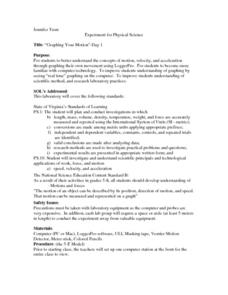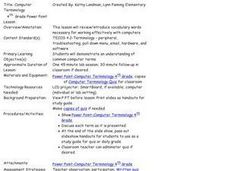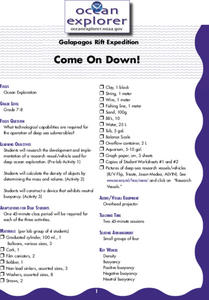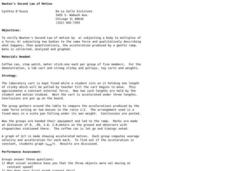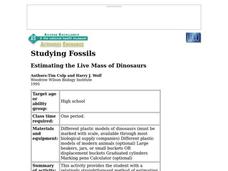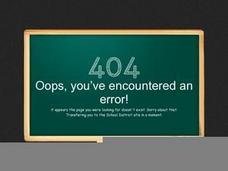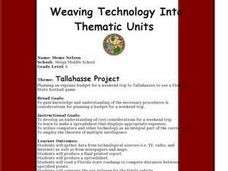Curated OER
Graphing Your Motion-Day 1
Ninth graders explore the concepts of motion, velocity and acceleration through graphing their own movement using LoggerPro. They become more familiar with the computer technology. Students explore graphing in real time and graph on...
Curated OER
Computers: What's a Mouse?
Fourth graders discover vocabulary terms associated with computer literacy. The lesson is divided into two segments - a lab session and classroom follow-up discussion. During a teacher-prepared Powerpoint presentation, 4th graders...
Curated OER
What Is Electricity
Fourth graders develop an understanding of static electricity and discover how to detect a charge by using electroscopes. For this electricity lesson, 4th graders complete a lab on electricity and discuss the results with the class.
Curated OER
A Hair Raising Experience
Students rotate through various lab stations in groups as they experiment with the concepts of conduction, induction and friction. They use a generator, aluminum pie pans, paper, plastic, styrofoam and other materials to complete their...
Curated OER
Gas Laws
Eighth graders use lab work and software to collect and analyze pressure and temperature data in order to illustrate the relationship between the temperature and pressure of a gas at a constant volume. They conduct a lab and organize...
Curated OER
Wolf Pack in a Bottle
Learners participate in an activity of a mock electrophoresis using paper chromatography to study DNA and genetic restriction mapping.
Curated OER
Galapagos Rift Expedition Come On Down!
Students research the development and implementation of a research vessel/vehicle used for deep ocean exploration. In this oceanography lesson, students calculate the density of objects by determining the mass and volume.
Curated OER
Proteins Expressed At Different Stages
Students investigate protein electrophoresis in a lab setting. Full laboratory equipment is needed and safety should be taught. The level of prior knowledge needed to perform lab is high and is ideal for an honors class.
Curated OER
Molecular Evolution in Plants
Students are using a paper chromatography study that is suitable for introductory biology. The absorption spectra studies and gel electrophoresis studies are appropriate for students who have complete both introductory biology and...
Curated OER
Newton's Second Law of Motion
Sixth graders study Newton's second law of motion and verify it. In this force and motion lesson students complete a lab activity and collect data, analyze it and graph it.
Curated OER
Polygons
Fourth graders identify and describe lines, shapes, and solids using formal geometric language. They use Inspiration to create a graphic organizer and outline of polygons.
Curated OER
Estimating the Live Mass of Dinosaurs
Students calculate the volume of scale model dinosaurs using a water displacement method. They use formulas to calculate the live mass each of the species of dinosaur. Then they complete and discuss a series of questions.
Curated OER
Estimating the Live Mass of Dinosaurs
Students estimate the live mass of dinosaurs. Using dinosaur and modern animal models, students use simple displacement methods to calculate the volume of the models. They calculate the masses of each model. Students compare the...
Curated OER
GEOBOP State Standards
Third graders write a report and draw a picture of the state of their choice. They use the internet to research their state's flower and write a paragraph about it. They also practiced inserting a picture from the internet to a word...
Curated OER
Take Care of Your Computer Poster and/or Slide Show
Students discuss taking care of technical devices. In groups, students illustrate each point and write a few words about it using KidPix. They print out results and mount on a large poster.
Curated OER
Studying Living Organisms
Young scholars discover and discuss the differences between prokaryotes and eukaryotes. Using a microscope, they examine various prepared slides of prokaryotic and eukaryotic organisms.
Curated OER
Watershed Analysis
Students conduct a regional watershed analysis of an area of their choosing. Using on-line data and their personal knowledge of the area, they determine the annual hydrologic budget and teach the class about "their" watershed.
Curated OER
Jeannette
Students develop hypothesis about what might happen when salt water is frozen. In groups, they freeze ice samples with different salt concentrations. They use the internet to research the situation of the Jeannette to discover their...
Curated OER
VECTORS
Ninth graders explore vectors. In this vectors instructional activity students complete a lab activity.
Curated OER
Laboratory - Density of a Material
Students conduct a lab (with water, guar gum and sodium borate) and carefully record physical and chemical properties and changes throughout the session, and experiment with weighing by difference.
Curated OER
The Electrophoresis of Human Hemoglobin
Students analyze different types of hemoglobin. They use the technique of agarose gel electrophoresis to separate human hemoglobin molecules according to their electrical charge, size, and/or shape. Students relate the migration of...
Curated OER
Tallahassee Project
Sixth graders gather information from technological sources such as TV, radio, and Internet as well as from newspapers and maps and produce a final printed report. They use the data to create a spreadsheet and read a Florida state...
Curated OER
Reading and Thinking About Evolution
Students explore evolution. They read magazine articles related to evolution. Students describe arguments for/against evolution that the author used. Students discuss their findings.
Curated OER
Weather Watchers - Interdisciplinary
Students investigate weather and climate through a variety of interdisciplinary activities.


